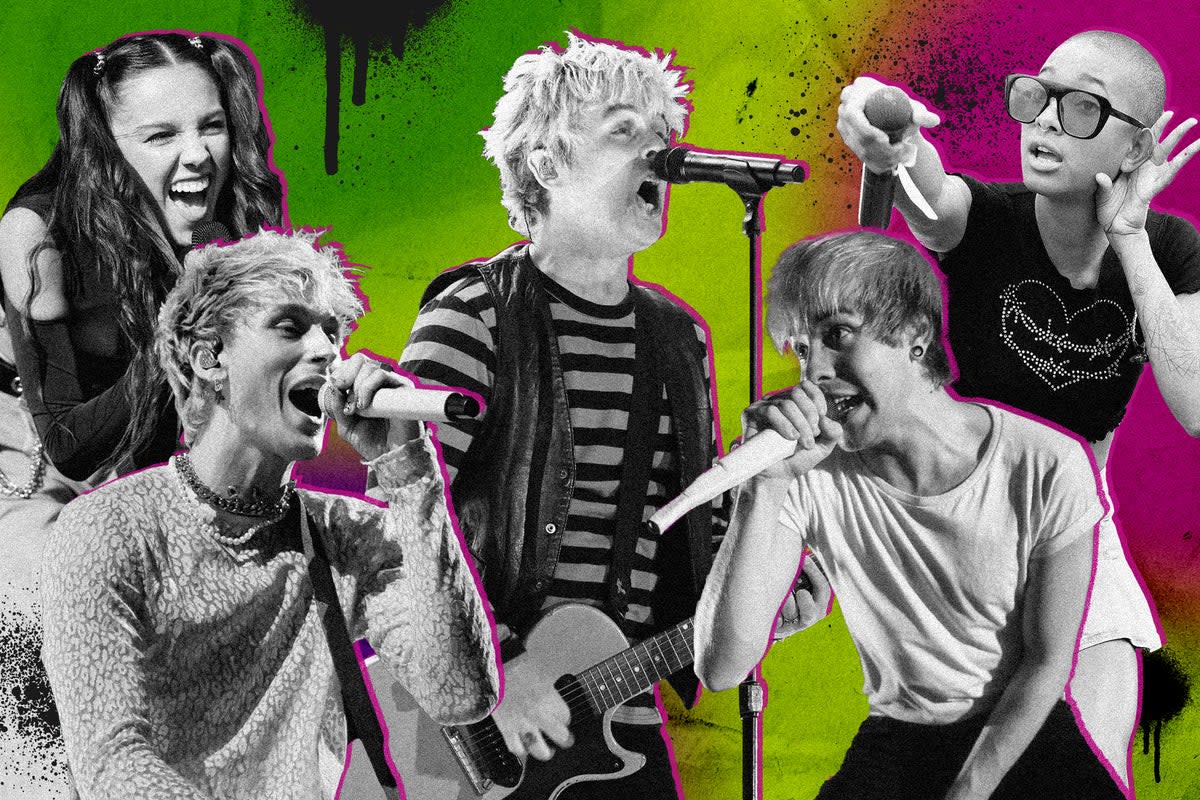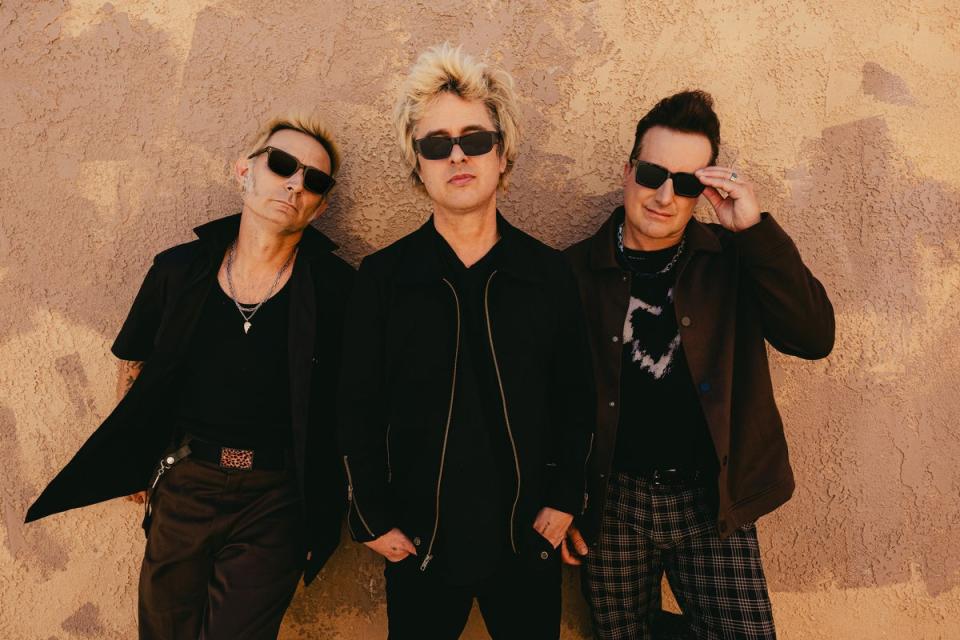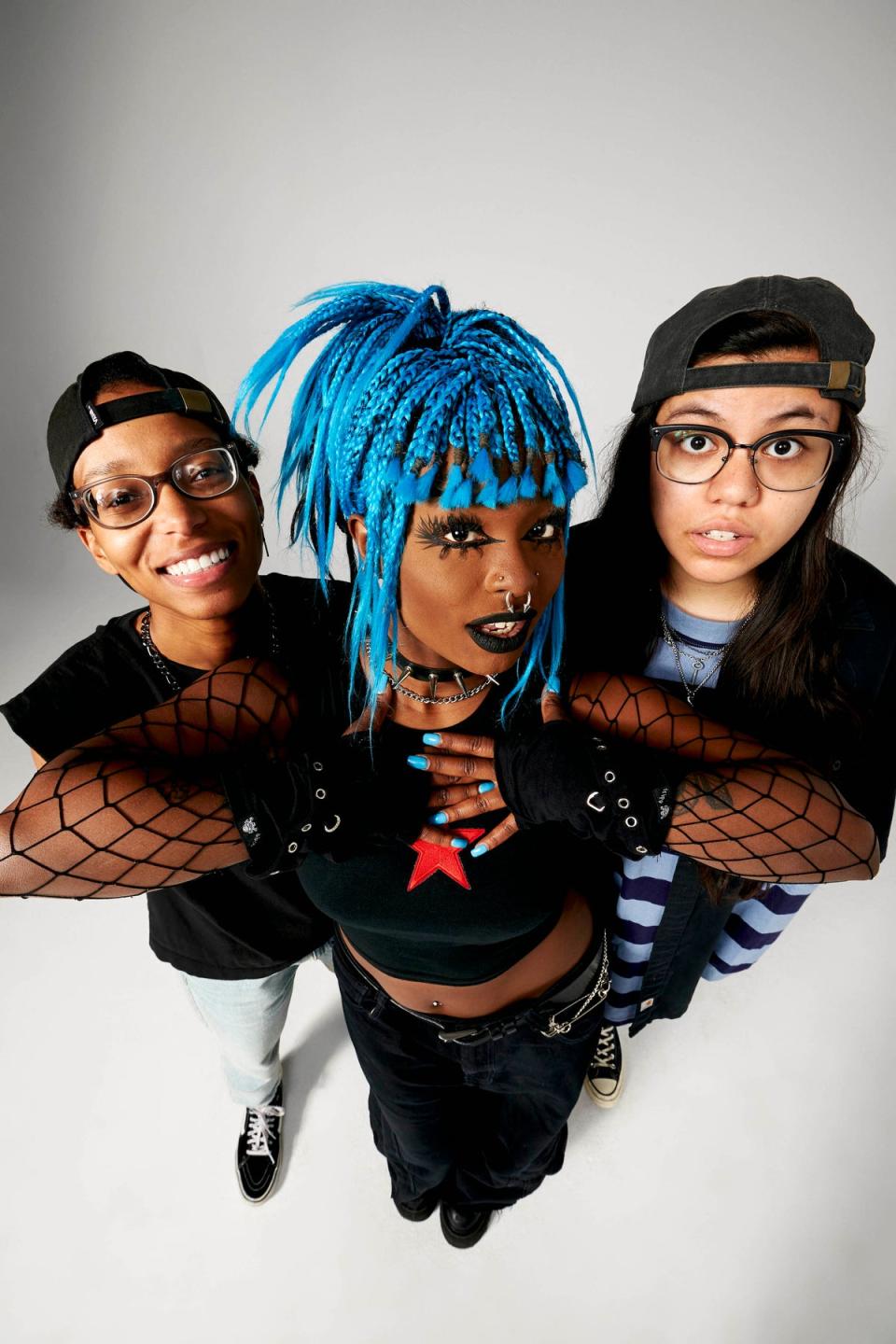Will pop-punk ever die? The worst music in the world is BACK BACK BACK!

- Oops!Something went wrong.Please try again later.
- Oops!Something went wrong.Please try again later.
- Oops!Something went wrong.Please try again later.
In a world of revivals – a product of what the writer Simon Reynolds termed “retromania” – some stick and some don’t. The post-punk revival of the Noughties, for example, lasted significantly longer than the original post-punk era. And pop-punk, whose resurgence began a couple of years ago thanks in part to the massive success of Olivia Rodrigo, whose hits draw on the sounds – speedy, melodic, raw – of 25 years earlier, is back with a bang in 2024. It’s not only a case of the genre’s influence being heard decades later, but those who stuck with it are once again reaping the rewards.
This week alone sees new albums from Green Day, who helped kickstart pop-punk’s first wave of commercial success in the Nineties, and Wrexham’s Neck Deep, arguably the most successful pop-punk band this side of the Atlantic. Both have big shows coming up, too: Neck Deep headline Alexandra Palace in March, while Green Day – now seemingly more popular than ever – have sold out their Wembley Stadium concert in June. Blink-182, their original line-up reunited, sold out arenas around the world last year, and the genre has its own dedicated festival – the tellingly titled When We Were Young, in Las Vegas – with an 85,000 capacity.
Why is this genre – in many respects unchanged in decades – having a moment now? Part of it is the cyclical nature of music, says Neck Deep singer Ben Barlow. “The generation that grew up with the big boom [of the Nineties and Noughties] are now tax-paying adults. They’ve grown up and they’re reminded of the music they grew up with.” What has reminded them, Barlow suggests, is the success of Rodrigo, Willow Smith and other similar artists, especially those who have come up through hip-hop, where there has been – to outsiders, at least – an unlikely embrace of snotty, bratty pop-punk.

“There’s an interesting wave of new takes on the genre,” says Josh Franceschi, singer of the UK band You Me At Six. He identifies sometimes-rappers Machine Gun Kelly – previously hyped as the next Eminem – and Yungblud as leading the way. “They’re the new spearheads of the pop-punk community,” he says. “There is a crossover between work ethic and mentality of those working in punk and those working in hip-hop because you have to go out and get it – you have to go away and carve out your space by working relentlessly.”
It’s not just work ethic that unites the scenes, he says. “I wasn’t surprised when that relationship started to blossom because there is a synergy and cross-pollination in fan bases. College kids tell me Machine Gun Kelly and YungBlud invented pop punk. Each generation thinks their bands invented it.” The crossover began with the rise of so-called “Soundcloud rap” – a variation on the genre in which young rappers began talking self-pityingly about their feelings, as pop-punkers had been prone to do in their more introspective moments. The querulous, accusatory tone of voice was also something both genres shared.
Crucial to this crossover has been Blink-182 drummer Travis Barker, whose reinvention as a reality TV star and later husband of Kourtney Kardashian has kept the idea of pop-punk visible in the mainstream. Second, and more importantly, even when few were paying much attention to Blink-182, Barker was collaborating with anyone and everyone, from big stars to newcomers – including both Machine Gun Kelly and Yungblud. “He has been the linchpin,” Franceschi says. “He’s been integral to the renaissance. He has driven so much of the crossover – producing artists and making them sound pop-punk. He has been pretty pivotal.”
The Kardashian link mattered for visibility, too. “He has been in A-list culture and his influence legitimises pop punk and gives it a co-sign and a stamp of approval,” Barlow adds. “When you’re married into the most famous family in the world, that’s a huge thing.”
Historically, pop-punk has been both very male and very white. Songs were often puerile – filled with innuendo (even now, deep into middle age, Blink-182’s stage banter revolves around sex). “Women were erased, and all the radical elements of punk were lost,” says Molly Tie, author of the forthcoming book Rebel Grrrls – The Story of Women and Punk. “In pop-punk songs, women were objects of affection – an object of desire, or an incredible girlfriend who was very compliant to the needs of the singer. Or they were b****es who thwarted your advances.”
When we did Reading last summer, I couldn’t get my head round why our audience was so young
Josh Franceshi of You Me At Six
That element was something that went back to the earliest days of Southern California pop-punk: back in the Eighties, genre forefathers the Descendents moaned about faithless girlfriends and judged them: “Even though you’ll never come clean, you know it’s true/ These sheets are dirty, and so are you,” they sang on 1987’s “Clean Sheets”. The newest wave of pop-punk artists, though, views the world differently: Tie says the new bands often talk about the effects of toxic masculinity in their songs.
There are also lots of women – including women of colour – involved this time round. Not just Rodrigo and Smith, but grassroots bands such as Meet Me @ the Altar, Pinkshift, and Hot Milk. It’s worth remembering, Tie points out, that there were female role models in pop punk – notably Hayley Williams of Paramore – but often they didn’t get the credit they were due, because purists perceived them as inauthentic. Avril Lavigne, she notes, was “a friendly, mainstream version of pop-punk, and she was a gateway for some, but other people resented her success”.
It’s worth remembering, too, that those who were kids in the Noughties were exposed to a kind of pop-punk early on, parcelled up as children’s entertainment. The British boy band Busted fit the bill, but so did the genre known as “Disney rock” – the music recorded by the likes of Miley Cyrus, Demi Lovato and Selena Gomez for Disney’s imprint Hollywood Records. Among the main songwriters for Hollywood were Gina Schock, one of the Go-Go’s, and members of the alternative rock band Ednaswap, so it shouldn’t come as much of a surprise that the songs they wrote came out as a cleaned-up, unthreatening, highly melodic version of punk. In other words, pop-punk.

That PG-rated mutation was important in shaping the tastes of audiences growing up, says Neck Deep’s Barlow. Simply by being present, it was absorbed by osmosis. “Having kids’ shows where the soundtrack was pop-punky means it could span a large audience,” he says. And while he says he had an older brother who was introducing him to the hard stuff, he was certainly aware of Busted doing something quite similar.
Pop-punk will likely never die. It has its roots in the very earliest days of punk – what were Ramones and Buzzcocks if not pop-punk? Ramones, especially, drew heavily on bubblegum pop (even covering lightweight 60s hits such as “Indian Giver” and “Little Bit O’ Soul”). There’s something eternally appealing about loud music that’s also melodic, speedy, and accessible. Every time a new wave breaks, the rising tide lifts everyone.
“When we did Reading last summer, I couldn’t get my head round why our audience was so young,” Josh Franceschi says. “This renaissance means there’s a whole generation of fans from 14 onwards discovering what their music tastes are. And all these new bands who are popular have put us on their fans’ radar.”
As another, rather different, Disney song put it: it’s the circle of life.
‘Saviours’ by Green Day is released via Warner on 19 January. Neck Deep’s self-titled album is released via Hopeless on the same day

